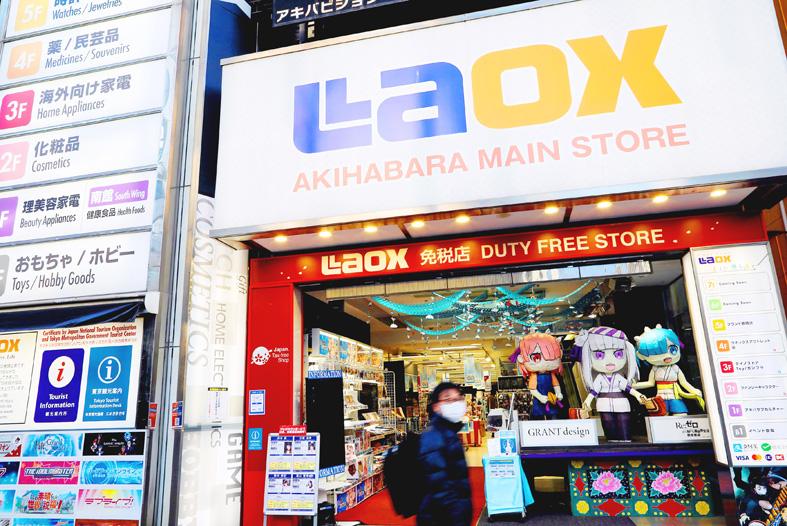Japan’s cuddly bear character Rilakkumma, who has captured the hearts of children and adults alike with his laid-back demeanor, sits on the shelves of a swanky department store in the capital, flanked by Hello Kitty and other plush toys.
As the Lunar New Year begins today, they are taking the place of home appliances, from rice cookers to electric toilet seats, normally favored by Chinese tourists who are absent this year because of coronavirus restrictions.
“Due to the current travel bans, it’s impossible for them to come to Japan,” said Jin Xuezhu, head of the inbound sales division at the duty-free retail chain Laox Co Ltd, which runs the store in Tokyo’s district of Akihabara.

Photo: Reuters
Chinese have accounted for 90 percent of the chain’s customers since 2014, Jin said, adding, “So the absence of that 90 percent has a huge impact on our business.”
The sharp contraction in global tourism brought by the pandemic forced the chain to shutter half of its 24 stores last year to cut costs and restore cash flow. It has refurbished its image, adding friendly touches to lure domestic customers.
“We have put out many hobby and toy goods that are unique to Akihabara,” Jin said. “Before we were branded as a duty-free shop, but last year we renovated our stores so that Japanese customers can also feel welcome.”
However, Laox has not forgotten its clientele in China, hosting live broadcasts from Tokyo since last autumn on Chinese e-commerce platforms, such as those of electronic giant Suning Appliance Co (蘇寧電器) and messaging app WeChat (微信).
“We have great expectations for online shopping through livestreams,” said Cui Wenzhe (崔文哲), manager of the chain’s live commerce section.
The chain hosted 350 such broadcasts last year and expects even better numbers during the Lunar New Year holiday, he said.
“We’re also looking forward to more sales events for Valentine’s Day,” he added.
Laox declined to provide details of the hit to current Lunar New Year sales, but acknowledged the pandemic’s “huge impact” on its business.
Although Japan has not suffered virus outbreaks on the scale of other major economies, such as Britain and the US, it has just extended by another month its state of emergency in Tokyo and other regions.
The continued travel ban, particularly the absence of holidaying Chinese for a second successive year, is expected to hurt Tokyo retailers further.

SEEKING CLARITY: Washington should not adopt measures that create uncertainties for ‘existing semiconductor investments,’ TSMC said referring to its US$165 billion in the US Taiwan Semiconductor Manufacturing Co (TSMC, 台積電) told the US that any future tariffs on Taiwanese semiconductors could reduce demand for chips and derail its pledge to increase its investment in Arizona. “New import restrictions could jeopardize current US leadership in the competitive technology industry and create uncertainties for many committed semiconductor capital projects in the US, including TSMC Arizona’s significant investment plan in Phoenix,” the chipmaker wrote in a letter to the US Department of Commerce. TSMC issued the warning in response to a solicitation for comments by the department on a possible tariff on semiconductor imports by US President Donald Trump’s

‘FAILED EXPORT CONTROLS’: Jensen Huang said that Washington should maximize the speed of AI diffusion, because not doing so would give competitors an advantage Nvidia Corp cofounder and chief executive officer Jensen Huang (黃仁勳) yesterday criticized the US government’s restrictions on exports of artificial intelligence (AI) chips to China, saying that the policy was a failure and would only spur China to accelerate AI development. The export controls gave China the spirit, motivation and government support to accelerate AI development, Huang told reporters at the Computex trade show in Taipei. The competition in China is already intense, given its strong software capabilities, extensive technology ecosystems and work efficiency, he said. “All in all, the export controls were a failure. The facts would suggest it,” he said. “The US

The government has launched a three-pronged strategy to attract local and international talent, aiming to position Taiwan as a new global hub following Nvidia Corp’s announcement that it has chosen Taipei as the site of its Taiwan headquarters. Nvidia cofounder and CEO Jensen Huang (黃仁勳) on Monday last week announced during his keynote speech at the Computex trade show in Taipei that the Nvidia Constellation, the company’s planned Taiwan headquarters, would be located in the Beitou-Shilin Technology Park (北投士林科技園區) in Taipei. Huang’s decision to establish a base in Taiwan is “primarily due to Taiwan’s talent pool and its strength in the semiconductor

French President Emmanuel Macron has expressed gratitude to Hon Hai Precision Industry Co (鴻海精密) for its plan to invest approximately 250 million euros (US$278 million) in a joint venture in France focused on the semiconductor and space industries. On his official X account on Tuesday, Macron thanked Hon Hai, also known globally as Foxconn Technology Group (富士康科技集團), for its investment projects announced at Choose France, a flagship economic summit held on Monday to attract foreign investment. In the post, Macron included a GIF displaying the national flag of the Republic of China (Taiwan), as he did for other foreign investors, including China-based